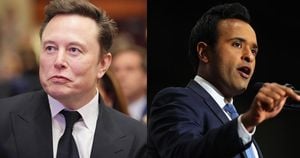Protests erupted this past week across Abkhazia, the separatist region of Georgia, as thousands of demonstrators stormed government buildings, demanding the resignation of their leader, President f. Qanunashvili. This civil unrest has highlighted deep political divisions and unmet public frustrations within the region.
On November 15, 2024, tensions boiled over when protesters, outraged by proposed measures to allow Russian citizens to buy property, took to the streets of the capital, Sukhumi. This agreement has been described by opponents as one poised to increase Russian influence and lead to inflated housing prices. It has provoked fears of cultural and territorial erosion among locals.
The flashpoint for the demonstrations appears to be the planned investment deal with Moscow, which many view as undermining national integrity. Demonstrators expressed their anger by storming key governmental establishments, leading to clashes with police forces, injuring at least 14 individuals during the protests.
One prominent figure among the opposition, Temur Gulia, emphasized the dire need for change. He declared, "If our demands for the president’s resignation are not met, we will have to form a temporary government to guarantee the proper functioning of state bodies." This indicates the protesters' resolve to not only demand immediate political changes but to also prepare for their own governance structure should their leader refuse to step down.
Gulia’s statement aligns with the sentiments simmering among the protesters. Citizens are disillusioned with what they perceive as President Qanunashvili's unsatisfactory leadership and his alignment with Russian interests, raising questions about the legitimacy of his administration. Throughout Sukhumi, opposition spirit has rallied people around the call for self-determination and autonomy from external pressures.
Further complicity was added to the narrative of unrest as President Qanunashvili, deflecting the demonstrators’ demand, denounced the protests as "an attempted coup d'état." While he has hinted at the possibility of organizing snap elections, insiders suggest his willingness might be contingent on the demonstrators vacuating the parliament building they currently occupy.
For many, these protests have become more than just opposition against property laws; they’re viewed as confrontation against the heavy-handedness of the president, who, many argue, serves Moscow's interests rather than the region’s.
The protesters steadily maintained control over the government complex and began dismantling security barriers around the area, symbolizing their determination to see change. Local media reported one opposition figure, Adgur Ardzinba, criticizing the government's approach to dealing with dissent, stating, "This barrier shows the government has decided to fence itself off from its people."
Before the latest upheaval, Abkhazia has had its fair share of tensed relations with Georgia and Russia, especially following the 2008 war, which solidified Russia's dominion over the region. Observers suggest such historical tensions, compounded by the current political atmosphere, make the potential for escalation concerning as Putin solidifies his grip on the Abkhazian leadership through economic ties.
Theoutpouring of public dissent indicates the populace's desire for agency over its destiny rather than remaining as vassals to Russian interests. Protesters are not merely reacting to property laws but contesting the erosion of their autonomy and the quality of governance they deserve.
Add to this mix the geopolitical chess game at play, where Abkhazia is often viewed as a pawn for Russian influence intended to destabilize Georgia, and the stakes become even higher. The unrest within its borders sends ripples through diplomatic conversations far beyond its mountainous terrain and Black Sea beaches, affecting regional relations and global geopolitical stability.
Despite the President's claims of maintaining control, the very fact remains: those who rally against him present not only voices of dissent but voices of unyielding resolve, prepared to fight for their futures and identities.
It remains to be seen how this situation will evolve, but the Abkhazian people hold the key to their future.



